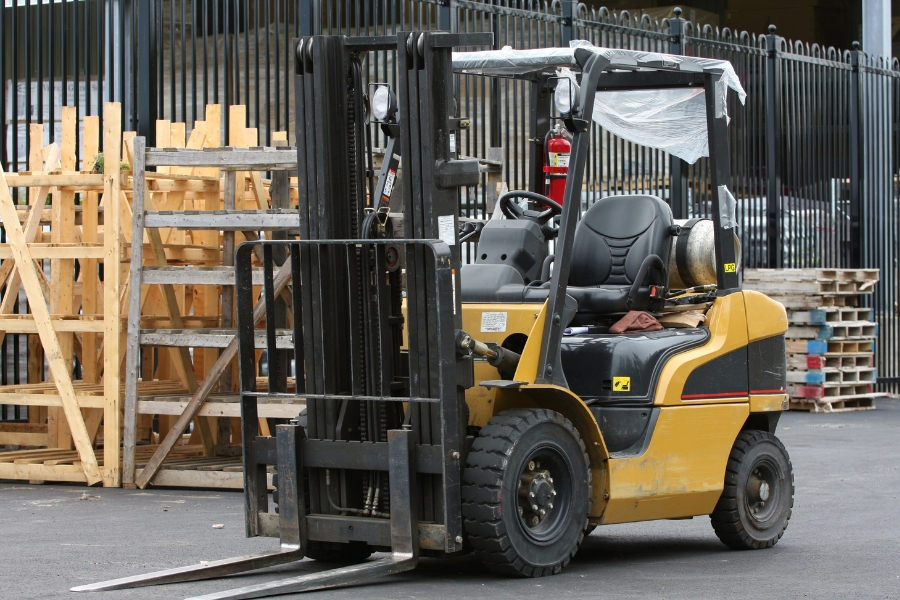There are few things as annoying as trouble with a vehicle. When that vehicle is essential to the day-to-day success of your business, it is even more frustrating. Let’s review some common issues—such as when your forklift won’t start and when the forklift mast won’t go down—and discover how our forklift troubleshooting advice can help.
Proper forklift maintenance is essential to the longevity of a fleet. It’s so important that the Occupational Safety and Health Administration (OSHA) requires forklift operators to perform daily forklift inspections (click here for our Ultimate Guide for Creating a Forklift Checklist). Not only do these daily inspections help ensure the safety of your workforce, but they also keep your fleet running and your workplace productive.
However, time plus wear and tear eventually break through even the most efficient and rigorously adhered to maintenance schedule, and you must deal with forklift repairs. For serious issues, we highly recommend that you call an experienced forklift repair team, such as the experts at Texas Motive Solutions. Our experienced service team can typically get to your site in 24 hours or less. Once we reach your site, our technician will analyze the issue, propose a solution and get to work immediately.
However, the only way to know when an issue is serious and when it is something you can manage is through thorough forklift troubleshooting. Whether you need Toyota, Mitsubishi, Caterpillar or Hyster forklift troubleshooting, here are some of the most common issues and our suggestions if you can do it yourself or should call an experienced forklift mechanic.
Forklift won’t start
Few things are as irritating as hopping in a vehicle (personal or professional) ready to begin the day, only to have it sit there lifeless as you try to start it.
When it comes to a forklift not starting, the forklift troubleshooting techniques are different whether you operate an electric forklift or an internal combustion engine forklift.
If you have an electric forklift, the most likely culprit is the battery. The first question is when was the battery last charged, and second, was the charging procedure performed correctly? Possibly, a connection was missed, and the battery sat idle all night instead of charging. (Incorrect socket connection can damage a battery. So, be sure to check the battery to ensure that it is still safe to use.)
A quick way to test the battery’s power is to try the forklift’s auxiliary functions. Check if the lights, brake lights, horn and other secondary systems work. If nothing happens, the problem is likely the battery. Check the battery for damage, and then put it on the charger. Hopefully, you have a different, fully charged battery to use in the meantime.
If the lights come on and the horn honks, the issue is probably something other than the battery. The system is designed to shut down when a forklift’s internal temperature gets too hot. The problem could be with the cooling system. High temperatures (or extreme temperature fluctuations) or exposure to certain chemicals can cause corrosion and cracking to the cooling system’s components. If you notice damage to the cooling system, call a technician to replace the damaged parts.
The most likely culprit for an internal combustion engine forklift is the gas. The first step is to make sure there is gas in the tank. This may seem like an obvious suggestion, but it happens. Another issue could be that the forklift’s fuel system needs to be flushed. Old fuel can sit in a tank for a while and degrade. If it gets sucked into the system, it can cause misfires and even a system shutdown.
If you smell gas while checking the system, there may be a leak. Call a technician to hunt down and patch the leak. Another issue could be that the radiator needs to be cleaned or, if you spot any corrosion on it, replaced.
Forklift mast problems
The forklift mast, also known as an upright, is the vertical component that controls the raising, lowering and tilting of a load. Even though the forks get most of the attention, they are attached to the mast, and it’s the mast that does all the heavy lifting.
Of the many components that come together to create the mast, the hydraulic system is likely the most important. The pressurized liquid that flows through the system is responsible for raising and lowering the forks. If you have an issue with the forklift mast dropping, the culprit could be a leak in the hydraulic system. Even a small leak can mean the system does not have enough pressure to move the forks.
So, if you experience a jerky or slow-moving mast, your first forklift hydraulics troubleshooting step is to check the fluid level. If the liquid is low, examine the hydraulic cylinders. If you notice fluid buildup, a seal or the entire cylinder must be replaced.
A leak in a hose is sometimes harder to spot. You may notice fluid on nearby components, which means the nearest hose is probably the offender. If you don’t see any obvious signs, try rubbing a clean cloth across the lines. If there’s a leak, the fabric will become wet or dirty, which should help you locate the problem. Also, look for puddles or wet spots. If all else fails, add hydraulic fluid and monitor the levels. If the fluid level continues to drop, there is a leak. However, if the fluid level seems fine, there may be debris in the hydraulic system or a dirty oil filter. Both can cause the system to clog.
If the hydraulics seem fine, the issue could be damage to a section of the mast. Check the chains and other mast components to see if they are rusted, worn or damaged. If you notice issues, the damaged part needs to be replaced.
Worn forks can also cause lifting issues. Wear and tear on the blades will cause them to lose density. When the forks have uneven wear, it becomes difficult to control the cargo. If you see cracks in the blades or differences in blade heights, it’s time for “fork lift repairs,” AKA a forklift fork repair.
Forklift transmission troubleshooting
The transmission plays a crucial role in controlling your forklift. Essentially, the system transports power generated by the engine to the wheels.
One of the main indications of a transmission problem is sluggish or hesitant gear shifts. When the transmission works flawlessly, an operator may not notice when the forklift shifts from one gear to another. However, if the machine hesitates after a gear shift or there is a delay when shifting from forward to reverse, that could signal a transmission issue.
Weird shaking is also a sign of potential transmission issues. If the machine stutters when turning or changing direction, it’s time for your forklift to visit a mechanic (or vice versa).
Strange noises are also an indication of a potential problem. Of course, the forklift is going to make some noise. After all, there are a lot of moving parts and gizmos (technical term) that combine to create your forklift. So, there are going to be some everyday dings and hums. However, if you start noticing new and repeating rattles, clangs, hisses or anything that sounds like metal grinding on metal, that may indicate that the transmission is wearing out. You should call an expert before a relatively minor issue becomes a significant problem.
If you believe your forklift is experiencing transmission issues, look at the transmission fluid. Dirty transmission fluid can damage the system. The color of the liquid should range from pink to bright pink. If it’s dark, thick, has bits of metal or a burning smell, it needs changing as soon as possible.
At Texas Motive Solutions, we believe that forklift performance and safety should be the top priority of everyone involved in forklift operations and maintenance, such as ensuring that a fleet’s batteries operate at peak efficiency. Our preventive maintenance program keeps your fleet running. We also offer a complimentary forklift fleet performance analysis to guarantee you have the correct batteries for your needs.
To schedule a complimentary analysis and for all forklift repair and maintenance needs, please give us a call at (888) 316-2459. You can also fill out a form to learn about our services and discover everything we can do for you.



